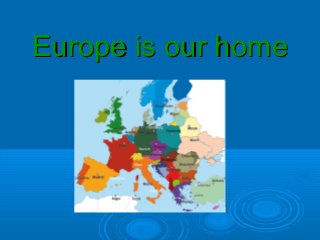
0958555 d550 f_europe_is_our_home
- 1. Europe is our home
- 3. The European Union PROS AND CONS
- 4. OUR CRACOW, OUR COPENHAGEN Today twenty-five countries belong to the European Union. More than 450 million Europeans have the right to live in, work in or travel to other EU countries. Millions of people enjoy friendly contact with their neighbours across borders. Governments across Europe pass the same laws about employment, food, transport, health and the environment. The EU is also the largest free market in the world. A typical European supermarket is full of fresh fruit, vegetables, cheese and meat which come from all over Europe. Twelve countries even use the same currency, the euro. In fact, the European Union has a very big influence over our lives, but most of us don't even notice it. But if we look at Europe just three generations ago, we start to understand that the story of the EU is even more surprising. In 1945, Europe had just experienced the most terrible war in history. Many historians believe that at least forty million people were killed, although such numbers are very hard to calculate. At the end of the war millions were homeless and much of Europe was in ruins. In fact, famine was a bigger problem in 1947 than it was during the war years. Worst of all, many countries still didn't trust each other. It is perhaps a surprise to learn that the first politician to suggest 'a United Europe' after the war was Winston Churchill, the British Prime Minister during the war years. In September 1946, during a meeting in Switzerland, he said that Europeans should come together to create a 'United States of Europe'. However, most people, especially in Britain, thought that Churchill's ideas were shocking or even absurd. Eight months later a huge conference was organised in the Netherlands. Eight hundred important European academics and politicians were invited. Despite the fine words and emotional speeches, the Netherlands conference couldn't save Europe — it was already divided in two. But the idea of 'a United Europe' didn't die completely. A French politician, Robert Schuman believed that the only way that France and Germany could become good neighbours again was by cooperating economically. In 1951, six countries agreed to regulate trade, prices and production of coal and steel. The experiment was a success, and in 1957 the six countries signed the Treaty of Rome and created the European Economic Community (in 1993, the EEC changed its name to the European Union). Nine more countries joined the organisation between 1973 and 1992 and another ten countries became members in 2004. Perhaps De Madariaga's dream will come true one day after all.
- 5. Scan the text “Our Cracow, Our Copenhagen”. Then answer the questions How many countries have the same currency? - Who suggested a “United States of Europe”? - When was the Treaty of Rome signed?
- 6. Put the events in the correct order. Then read the text again and check your answers. A major conference is organised. □ Churchill suggests “ a United States of Europe. □ Schuman tries to keep the idea of cooperation alive. □ The EEC becomes the EU. □ The EEC is created. □
- 7. Read the text again. Tick true and cross false. Then correct the wrong sentences. Not all EU countries have introduced the euro. Hunger was a big problem in Europe, even two years after the end of the war. Some countries didn't have a good relationship with each other after the war. Churchill's ideas about 'a United Europe' were very popular. The Netherlands conference was a success. De Madariaga's vision has become reality.
- 8. Listen and decide which speakers have negative opinions about the EU. Then listen again and match speakers 1-5 with opinions a-e. Speaker 1 □ a The EU sometimes seems to waste money. Speaker 2 □ b It makes Europe more Speaker 3 □ democratic and peaceful. c Too many decisions are Speaker 4 □ made for us without Speaker 5 □ consultation. d It makes it easier for young people to travel and study abroad. e it makes Europe more competitive economically